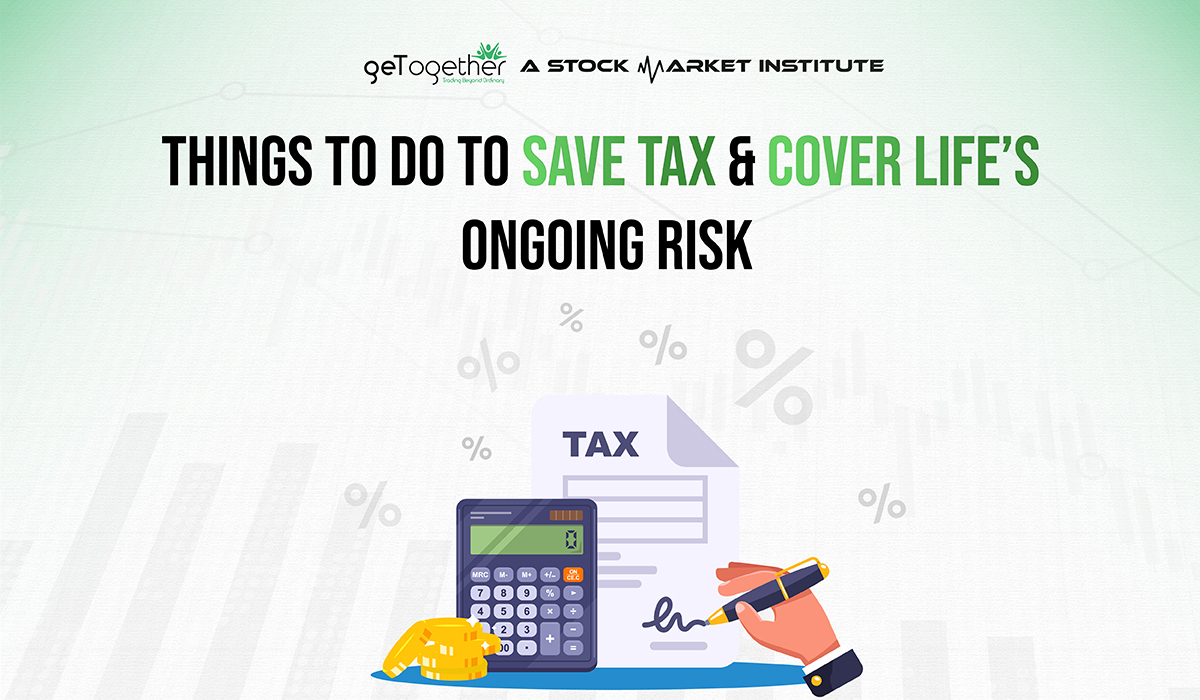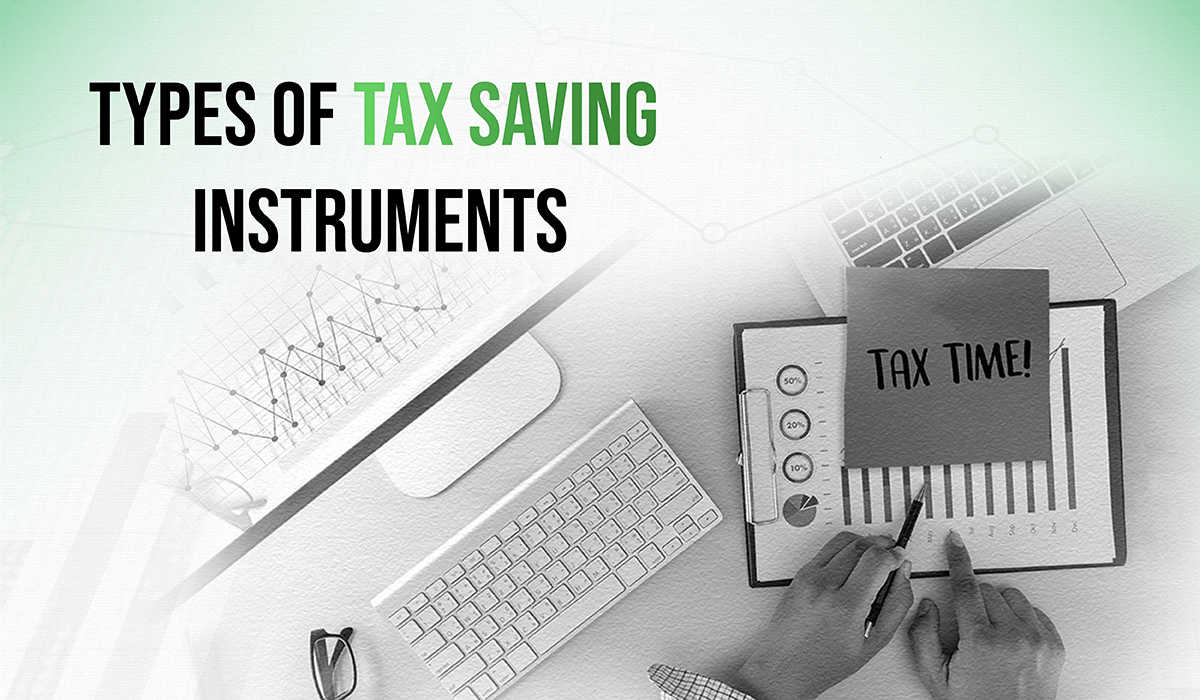
INTRODUCTION
Tax planning and risk coverage are essential aspects of managing personal finances. By implementing smart strategies, individuals can save tax and protect themselves from life’s ongoing risks. In this article, we will explore various actions that can be taken to save tax and cover these risks effectively.
Managing finances involves making informed decisions to optimize savings and protect against unforeseen events. By understanding the importance of tax savings and risk coverage, individuals can secure their financial well-being. Tax savings allow individuals to minimize their tax liabilities and keep more money in their pockets. These extra savings can be utilized to cover ongoing risks, such as medical emergencies, accidents, or unexpected financial setbacks.
INVEST IN TAX SAVING INSTRUMENTS
Investing in tax savings instruments helps you to save tax. Public Provident Fund (PPF), National Pension System (NPS), Equity-Linked Saving Scheme (ELSS), and so on are a few examples to save tax. They not only offer tax benefits but also offer a good return on investment. According to section 80C of the Income Tax Act, an individual can claim a deduction of up to 1.5 lakhs in a financial year just by investing in, such as PPF, ELSS, National Savings Certificate (NSC), Senior Citizens Savings Scheme (SCSS), etc. So, don’t forget to take advantage of these schemes and get the best out of them to save tax.
TYPES OF TAX SAVING INSTRUMENTS

1. ELSS – Equity-Linked Savings Scheme:
A type of mutual fund called the equity-linked savings scheme (ELSS) primarily invests in the stock market or equity. Investments of up to 1.5 lakhs done in ELSS plans are qualified for charge allowance under Segment 80C of the Annual Duty Act. It has a lock-in period of 3 years. However, the returns from the ELSS are subject to market risks.
2. PPF – Public Provident Funds:
The Public Provident Scheme is a well-liked way to save money on investments and taxes. To get started with this long-term savings and investment product, you must open a PPF account at the post office or designated public and private sector bank branches. The PPF account pays a fixed interest rate for contributions. These deposits are eligible for Section 80C deductions up to Rs 1.5 lakh per financial year. It is a savings scheme with a lock-in period of 15 years.
3. Tax-Saving Fixed Deposit (FD):
This is a type of fixed deposit that offers tax benefits to investors. One can invest up to Rs 1.5 lakh on tax benefit fixed deposit and are eligible for tax deductions under Section 80C of the Income Tax Act. It is easy to open and manage online through the official website of the banks, making it an even more convenient and likable option.
Moreover, it has a low-risk investment option with a lock-in period of 5 years, making it a long-term investment plan. Tax-saving FDs are popular among investors who want a safe and secure investment option with tax benefits
4. Claim Deductions on Home Loans:
You can claim a deduction on both the principal and interest components of the loan if you take a home loan. Under section 80C, an individual is eligible for up to a Rs 1.5 lakh deduction on the principal components. While on the other hand, according to Section 24, the interest component of the home loan is eligible for deductions up to Rs. 2 lakhs.
5. Unit-Linked Insurance Plan (ULIP):
A unit-linked insurance plan (ULIP) is a form of insurance policy that provides insurance coverage and investment opportunities. A portion of the premium paid for ULIPs is invested in equity and debt instruments, delivering market-linked returns to the policyholder. Investments in ULIPs up to INR 1.5 lakh per year are tax deductible under Section 80C of the Income Tax Act. ULIPs can be acquired online through a variety of insurance portals.
For taxpayers who want to combine insurance and investing benefits, ULIPs are a smart investment alternative. It provides insurance coverage and the possibility for significant returns, making it a convenient option for investors seeking a two-for-one deal.
6. Purchase Health Insurance:
Health insurance provides safety and financial protection against medical emergencies and helps to save tax. Under section 80D, individuals can claim up to Rs 25000 health insurance premiums paid for themselves and their families. And if you are a senior citizen, the deduction rate is even higher at Rs 50000.
BENEFITS OF TAX DEDUCTIONS AND CREDITS:
One of the most crucial ways to save tax is to take the benefits of tax deductions and credits. Deductions are expenses that can be subtracted from your taxable income, while credits are amounts that can be subtracted directly from your tax liability.
Some common deductions and credits include:
Charitable donations:
the deduction amount may vary depending on the charity type but can range from 50% to 100% of the donated amount.
Retirement contributions:
PPF, NPS, and EPF qualify under section 80C. The tax deduction limit of Rs 1.5 lakh per financial year. You can reduce your taxable income and the taxes you owe by taking advantage of these deductions and credits.
Claim deduction for insurance premiums:
If you buy life insurance, you can deduct the premiums paid under Section 80C of the Income Tax Act. This not only lowers your tax liability but also gives financial security to your family in the event of your unexpected death.
PROTECTION FROM LIFE’S AND FAMILY’S ONGOING RISKS:
1. Buying Life Insurance:
Another way to save tax is to buy life insurance. Life insurance is beneficial not only in the long run but also when it comes to tax deductions. While the vast majority could do without pondering the chance of unforeseen occasions, it’s essential to be ready assuming that something occurs.
2. Take advantage of the National Pension Scheme (NPS):
The National Pension Scheme (NPS) is a retirement-focused investment instrument that lets you build a retirement fund while lowering your tax bill. Contributions made following Section 80D(1) of the Income Tax Act are eligible for tax deductions. In addition, the NPS provides investors with a variety of investment options and fund managers.
3. Investing in Disability Insurance:
Disability insurance is one more sort of protection one can put resources into. Disability insurance, for example, can provide financial protection in the event of an unexpected event. They might become ill or disabled as a result of unforeseen circumstances. This insurance may assist in generating income. It can cover clinical costs, lost pay, and different costs connected with the handicap.
4. Investing in Mutual Funds:
Mutual funds are an incredible method for arriving if you are searching for abundance creation. They provide liquidity, diversity, and expert management advantages. Additionally, there are various options available. This includes hybrid funds, equity funds, and debt funds, depending on your investment objectives and risk tolerance.
Because they provide liquidity, it is simple to purchase and sell shares at any time and from any location. Investing in mutual funds in India has become progressively well-known now. Additionally, you can adjust it to your particular necessities and financial objectives.
CONCLUSION
Managing ongoing risks and saving tax requires a decent approach to personal finance. Creating a budget, and reviewing your insurance policy are always good moves forward. You can achieve financial security and peace of mind for yourself and your family with the right mindset and strategies. Investing in tax saving schemes and policies is a way to save money in the long run and secure your life.
FAQs
1. How can I save tax?
Maximizing retirement account contributions, taking advantage of tax deductions and credits, making use of tax-advantaged savings accounts, and investigating tax-efficient investments are all ways to save tax.
2. Why is risk inclusion significant?
Risk coverage is crucial because it shields individuals and their families from unforeseen circumstances like accidents, financial setbacks, or medical emergencies. In challenging times, financial security is provided by adequate insurance coverage and emergency funds.
3. How might I advance my medical coverage to charge reserve funds?
Understanding your plan’s tax-deductible components, such as premiums or eligible medical expenses, is necessary to save tax. You can reduce your overall tax burden by making use of these deductions.
4. What is an emergency fund used for?
Individuals can cover unexpected expenses without resorting to high-interest debt or jeopardizing their long-term financial objectives by having an emergency fund that serves as a financial safety net. In times of emergency, it provides stability and calmness of mind.
5. How can I keep up with changes and new tax laws?
You can use online resources provided by official tax authorities, consult with tax professionals, and subscribe to reputable tax-related publications to stay up to date on tax laws and changes.

INTRODUCTION
The world of iInvesting in the stock market is a great way of generating passive income. Passive income refers to a regular source of earnings that requires minimal effort to maintain. It can generate extra cash flow, whether you’re running a side hustle or trying to get a little extra each month, especially at a time of inflation. Among the various options available, the stock market stands out as a reliable and best source of passive income for investors. Being a beginner or professional, generating passive income is very important these days. In this article, we will explore 10 compelling reasons why the stock market is considered the best passive income source.
EXPLORING THE REASONS FOR INVESTING IN THE STOCK MARKET FOR PASSIVE INCOME:

1. LONG-TERM GROWTH POTENTIAL:
The stock market has a proven track record of delivering high returns over the long term. While there are risks involved, well-researched investments have the potential to grow significantly and generate substantial profits. Have thorough research before selecting the stocks or investing in diversified funds, investors can benefit from the compounding effect and harness the power of market growth.
2. DIVERSIFICATION OPPORTUNITIES:
There are numerous investment options available across a variety of sectors and industries on the stock market. By diversifying one’s investment portfolio, people can spread their risk, so due to the poor performance of a particular stock does not affect their whole investment. Moreover, because of diversification, your funds are not blocked in one stock and are distributed in different stocks. this is a key strategy for making steady and long-term passive income from the stock market.
3. WEALTH CREATION:
The stock market provides a way for wealth generation and the potential to achieve financial independence. By consistently investing in quality stocks over time, individuals can build a substantial investment portfolio that generates significant passive income. This passive income can support individuals’ lifestyle choices by reducing the reliability on single income source and creating financial freedom.
4. FLEXIBILITY AND ACCESSIBILITY:
Like no other passive income source, the stock market offers investors flexibility and accessibility. Buying and selling stocks has never been easier and the credit goes to online trading platforms. The market’s accessibility to investors from all over the world makes it a convenient choice for those looking to generate passive income.
5. TAX ADVANTAGES:
The stock market offers certain tax advantages that can enhance the profitability of passive income. For example, The tax rates on qualified dividends are lower than those on ordinary income. Long-term capital gains from selling stocks that have been held for more than a year are also taxed at lower rates. These tax benefits contribute to the attractiveness of generating passive income from the stock market.
6. COMPOUNDING RETURNS:
When it comes to investing, compounding is a powerful idea that involves earning returns on both your initial investment and previous returns. You must reinvest your returns back into your account to earn double profits. The compounding effect amplifies the passive income generated from stock market investments, providing a greater potential for wealth accumulation.
7. HEDGE AGAINST INFLATION:
Investing in the stock market can be a good way to hedge against inflation because cash loses value over time. This is because businesses can raise the prices of their goods and services to keep up with inflation. This increases revenues and earnings, which in turn drives up stock prices. Consequently, despite the effects of inflation, investing in stocks can assist investors in maintaining their standard of living and even growing their wealth over time.
8. DIVIDEND PAYMENTS:
Many companies distribute a portion of their profits to shareholders in the form of dividends. Dividend stocks offer a reliable stream of passive income, as these payments are typically made regularly. By investing in dividend-paying stocks, individuals can enjoy a consistent income stream without actively participating in the company’s operations.
9. PROFESSIONAL MANAGEMENT:
For individuals who do not have time to manage stocks or investments, there are mutual funds and exchange-traded funds managed by professional fund managers. These funds pool investments from multiple investors and provide exposure to a diversified portfolio of stocks. Professional management allows individuals to benefit from expert decision-making and reduces the need for active involvement.
10. CAPITAL APPRECIATION:
While profits give a reliable stream of passive income and automated revenue, the stock market likewise offers the potential for capital appreciation. The value of a company’s stock can rise over time as it expands and makes more money. Investors can reap the benefits of this capital appreciation and ensure steady growth by holding onto stocks over the long term.
Noticing that capital appreciation that likely comes with the risk of market volatility. Short-term factors like economic conditions, company performance, or investor sentiment can cause stock prices to fluctuate. Investors, on the other hand, who have a long-term investment horizon can weather these changes and possibly benefit from capital appreciation.
CONCLUSION
In today’s time when everyone is seeking several sources for generating income. The stock market presents an excellent opportunity for individuals seeking passive income. By understanding the technicals of investing, diversifying portfolios, and adopting long-term strategies, investors can generate regular passive income. However, it is essential to carefully assess risks, monitor investments, and stay informed about market conditions to make informed decisions. By reading the above-listed reasons you will know that if you want to generate passive income, the stock market is the best source of it.
FAQs
1. Is investing in the stock market risky for passive income?
Stock prices can change quickly, so there’s some risk. But you can reduce risks and increase your chances of getting reliable passive income by diversifying your portfolio, investing over time, and choosing dependable businesses.
2. How much money do I need to invest in the stock market for passive income?
The amount of money required to invest in the stock market for passive income can vary depending on individual circumstances and goals. With the availability of fractional shares and low-cost investment platforms, it is possible to start investing in small amounts.
3. Can I rely solely on the stock market for passive income?
The stock market is a great source of generating passive income but involves risk, so to rely solely on it would not be appropriate. One must diversify their portfolio to minimize risks and generate passive income.
4. How often are dividends paid in the stock market?
Dividends are typically paid by companies quarterly. However, some companies may distribute dividends annually or on a different schedule. It is important to research and choose companies with a history of consistent dividend payments.
5. How can I get started with investing in the stock market for passive income?
To get started with investing in the stock market, you can open an account with a reputable brokerage firm or use an online investment platform. It is recommended to educate yourself about investment strategies, diversification, and risk management before making any investment decisions as proper knowledge and valuable skills are very important.